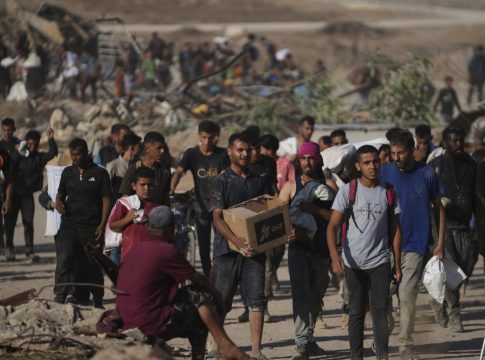A Taste of Humanity: Food and Survival in Gaza
Hospitality Under Fire: A Stressed Supply Line
Imagine the tantalizing aroma of spices filling the air, the sizzle of a sautéed dish beckoning you to the dinner table. Now, picture that same table set against a backdrop of war, where families scramble for survival amid the chaos. This is the reality for many in Gaza, where food, once a symbol of togetherness, has become a perilous quest.
As the sun casts long shadows over the distribution sites run by the U.S.-backed Gaza Humanitarian Foundation, the scene turns chaotic. With limited hours and heavy presence of Israeli military forces, eager crowds gather, their hopes pinned on the prospect of food—only to face grave dangers instead.
The High Stakes of Hunger
Desperate Measures
In a tragic twist, reports from anonymous Israeli soldiers suggest orders to fire on unarmed civilians seeking sustenance, turning basic needs into a life-threatening endeavor. With the Gaza Health Ministry citing over 500 casualties in a month, the simple act of reaching for food has morphed into a deadly gamble. As families flock to these distribution sites, they are met not with the warmth of community but with the cold reality of conflict.
A Dangerous Game
Imagine waiting in line for a much-anticipated meal—a hearty stew, perhaps, or a rich falafel wrap. But instead of dueling forks and joy-filled chatter, the tension is palpable; the atmosphere replaced by anxiety as the threat of gunfire looms near. It’s like a deadly version of "red light, green light," where survival is the ultimate prize.
Culinary Alchemy Amidst Chaos
While the Gaza Humanitarian Foundation works to deliver food parcels, challenges abound. Witnesses recount scenes of chaos, where boxes are torn open in desperation, offering a glimpse of rations that become both hope and currency on the black market. The question remains—how can humanitarian aid effectively serve those who need it most, without being tethered to military objectives?
The Chef’s Challenge: Humanitarian Aid or Military Strategy?
In this fraught environment, organizations like Doctors Without Borders have voiced their concerns, insisting that food aid must not become a weapon in a broader conflict. Their dire warnings resonate like a chorus, emphasizing that the significant problem lies not in hunger alone, but in the mishandling of humanitarian efforts.
“It’s a slaughter masquerading as humanitarian aid,” a statement that echoes beyond the borders of Gaza, rings painfully true. Moreover, volunteers like Dr. Adil Husain recount haunting tales from the hospital wards, describing young patients arriving with life-altering injuries, all due to exploration for food.
A Call for Change
As the world looks on, a call for reform seems urgent. The question remains: How do we feed those in need without compromising life? The food experience in Gaza serves as a stark reminder of the intersection of culture, conflict, and camaraderie.
In the end, food should unite, not divide; it should nourish, not destroy. Let this story not just be another headline but a clarion call for collective action and compassion.
🌍 Together, we can work towards making every meal a celebration of resilience and peace.

Covers wellness, nutrition, mental health, and daily life tips.
Bio: Talia brings a background in health journalism and holistic living to help readers live better, one tip at a time.

